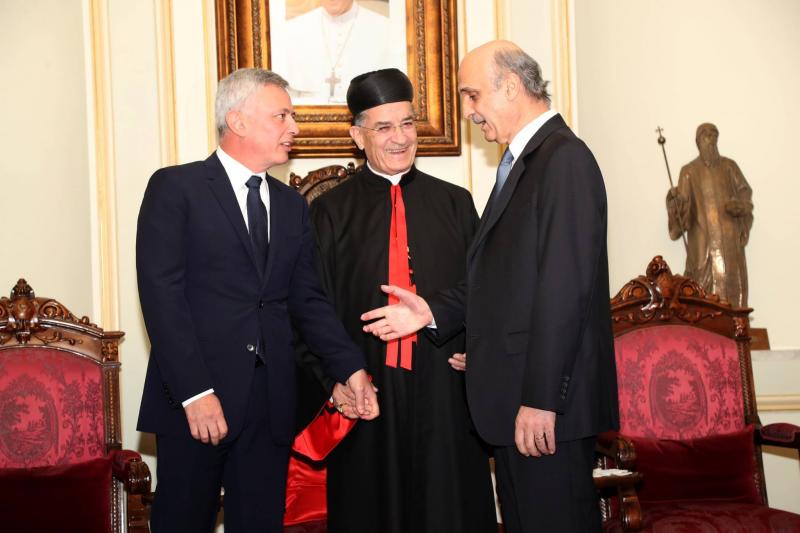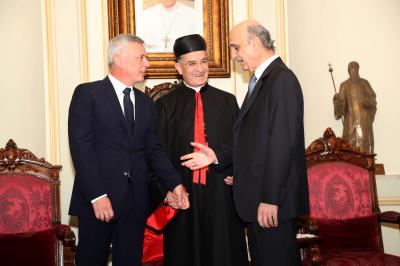For the second consecutive week, Walid Jumblatt is making a significant impact on the stagnant political scene, by moving from his usual position to another square on the Lebanese political chessboard. This naturally calls for the movement and change of other pieces and pawns on the local board. Last week, he moved a pawn by inviting Suleiman Franjieh and his family to dinner at his home in Clemenceau, under the banner of reinforcing traditions and strengthening the historical familial ties between the Franjieh and Jumblatt families and their regions, Zgharta and Mukhtara. The dinner carried political signals and messages in all directions for those concerned.
In the second week, this week, Abu Taimour continued his chessboard maneuvering with two moves, showcasing all the political professionalism and interest in achieving benefits. The first move involved attending a dinner at the Iranian embassy, which was imperative to attend in the current circumstances, raising the banner of resistance alongside a stream of admiration for Yahya Sinwar and his military plans, while expressing his openness to voting for Suleiman Franjieh. He completed his move by making a significant statement, calling for Iran to be included in the quintet committee, stating: "The adjustment of the quintet is to become 'plus one'," implying indirectly that there is little point in discussing the presidential file as long as Iran is outside the committee.
In reality, Jumblatt, through his actions last week and this week, has once again demonstrated that he is a first-class political chess player, adept at "political billiards," meaning he makes a move that leads to the movement of other pieces, followed by a corner shot that mixes all the "balls" on the table. While taking steps forward, he remains cautiously aware to ensure profit and minimize losses if they are to occur.
If the idea of including Iran in the quintet committee had been on his mind for a long time, he did not rush to propose it prematurely, instead waiting for the right moment after Saudi Arabia opened its relations with Iran. He waited to confirm the seriousness of Riyadh's steps towards Tehran before proposing to include Iran in the quintet. In this way, Jumblatt has secured a point of bias in favor of him with Tehran and Hezbollah, while not provoking anger or displeasure from the prince sitting in Neom on the Red Sea.
Thus, Jumblatt, attentive to regional and local winds, has dealt a significant and positive blow for Tehran and Hezbollah without losing favor or connections with the rising prince in the land of the two holy mosques. However, the hasty and frustrated Jumblatt, weary of past gaps and stumbles, quickly abandoned what he had once taken the lead on, doing so in a surprising manner. The newspaper that interviewed him noted that he "smirks ironically when reminded of the slogan 'Lebanon First,' saying, 'Times have changed from the days when we raised that silly slogan during what was called March 14.'"
Jumblatt, who has distanced himself from the "ridiculousness of the March 14 slogan," seems to have forgotten that he was one of its prominent leaders, and that martyrs from that movement were friends of his father's. He contributed to introducing that "silly movement" and led the country into dangerous and sensitive bends.
In reality, while the slogan "Lebanon First" may have seemed silly and superficial, it is astonishing that the one now criticizing it was the first to contribute to its creation and promotion. But Jumblatt was not the only figure beginning to descend from the tree and prepare for the upcoming wave from the shores of Gaza. President of the Free Patriotic Movement, another "player" opposite Jumblatt, quickly took preemptive steps parallel to Jumblatt's, by attending a session to approve the budget after a long absence, under the pretext of "legislative necessity" without much enthusiasm, while engaging in fervent and open flattery towards President Nabih Berri and the "ruling duo," which had now become a trio with his joining.
The astute Gibran paved the way for a retreat with preliminary statements, aligning himself with the approval for the election of Suleiman Franjieh, or whoever emerges from the next equations, saying: "I will not accept. They will wait a long time unless one condition is met: giving us expanded administrative and financial decentralization and the credit fund, along with agreeing on a governance program for the new era. At that point, I will proceed with both." He added, "The first two points are more important to me, even more so than Suleiman Franjieh, Joseph Aoun, or anyone else."
While Jumblatt expressed openly that "I have no objection to going with Suleiman Franjieh," Bassil linked his approval to terms that are not impossible to achieve, mimicking the character of Juha by imposing vague and unrealistic conditions, and calling for the achievement of two projects that have become demands for many: administrative decentralization and the sovereign fund.
Ultimately, considering these internal factors alongside regional developments, Suleiman Franjieh is now closer than ever to the Baabda Palace, coinciding with regional developments that are being shaped by iron and fire, suggesting he may have to wait until the end of the Gaza war as some positions indicate, unless unforeseen developments intervene to alter the established equations in the region that undoubtedly affect Lebanon.




